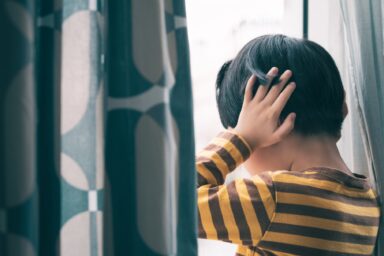Overview

The word psychosis is used to describe conditions that affect the mind, in which people have trouble distinguishing between what is real and what is not. When this occurs, it is called a psychotic episode. A first episode of psychosis is often very frightening, confusing and distressing, particularly because it is an unfamiliar experience.
About three out of every 100 people will experience an episode of psychosis in their lifetime. Psychosis affects men and women equally and occurs across all cultures and socioeconomic groups. Psychosis usually first appears in a person's late teens or early twenties.
Psychotic illnesses seem to affect women at a later age than men, when women may be farther along in their social and work lives. On the whole, women respond better than men to most treatments. However, there are times when the risk of relapse for women is greater. These times are before their period is due, after childbirth and around menopause. This suggests that women's hormones may in some way affect psychosis.
A number of mental illnesses can include psychosis as a symptom, including:
- Schizophrenia : A person has some psychotic symptoms for at least six months, with a significant decline in the ability to function.
- Schizophreniform disorder: A person has some psychotic symptoms for more than one month and less than six months.
- Bipolar mood disorders : With this type of illness, the symptoms of psychosis relate more to mood disturbance than to thought disturbance.
- Schizoaffective disorder: A person will have symptoms of schizophrenia and, at some point in the course of illness, concurrent symptoms of a mood disturbance.
- Depression with psychotic features: A person has severe depression and symptoms of psychosis without the mania associated with bipolar disorder.
- Drug-induced psychosis: The use of drugs such as cocaine, LSD , amphetamine and cannabis can sometimes cause psychotic symptoms.
- Organic psychosis: Sometimes, symptoms of psychosis may appear as a result of a physical illness or a head injury.
- Brief psychotic disorder: This type of psychosis usually lasts less than a month. It is sometimes triggered by a major stress in the person's life, such as a death in the family.
- Delusional disorder: This type of psychosis consists of very strong, fixed beliefs in things that are not true, without the presence of hallucinations.
- Who gets psychosis?
- Young people are especially likely to get it, but doctors don’t know why. It most often starts when you're in your teens to late 20s. But it can also affect older people and, rarely, children.
- How common is psychosis?
- It's hard to know exactly how common psychosis is. Studies have shown that it affects from 15 to 100 out of every 100,000 people each year.
- Psychosis vs. schizophrenia
- Psychosis is a symptom of schizophrenia, a complicated mental illness that also has other symptoms. Psychosis can also be a symptom of other conditions, such as serious depression.
- Psychosis vs. neurosis
- Doctors used to use the term "neurosis" to describe what they now call anxiety disorders. Symptoms of these disorders may include obsessive thoughts, irrational fears, or compulsive behaviors. But unlike psychosis, they don't involve losing touch with reality.
Signs & Symptoms
Psychosis affects the way a person thinks, feels and behaves. The experience of psychosis varies greatly from person to person. Psychosis can come on suddenly or can develop very gradually.
The symptoms of psychosis are often categorized as either “positive” or “negative.”
Positive symptoms are those that add to or distort the person’s normal functioning. They include:
- delusions (false beliefs that are firmly held and are out of keeping with the person’s culture)
- hallucinations (hearing, seeing, tasting, smelling or feeling something that is not actually there)
- disorganized speech, thoughts or behaviour (e.g., switching rapidly between subjects in speaking; finding it hard to concentrate or follow a conversation; being unable to complete everyday tasks).
Negative symptoms involve normal functioning becoming lost or reduced. They may include:
- restricted emotional and facial expression
- restricted speech and verbal fluency
- difficulty with generating ideas or thoughts
- reduced ability to begin tasks
- reduced socialization and motivation.
Other symptoms may include:
- cognitive symptoms, such as difficulties with attention, concentration and memory
- mood changes
- suicidal thoughts or behaviors'
- substance abuse
- sleep disturbances.
Causes & Risk Factors
Psychosis occurs in a variety of mental and physical disorders, so it is often difficult to know what has caused a first episode. Research shows that a combination of biological factors, including genetic factors, place a person at greater risk of developing symptoms of psychosis. For such a person, a psychotic episode may be triggered by many different environmental factors, such as stressful events or substance use.
An imbalance in brain chemicals such as dopamine and serotonin can also be a factor.
A person who is having symptoms of psychosis should have a thorough medical assessment to rule out any physical illness that may be the cause.
Diagnosis & Treatment
Psychosis can be treated, and many people make a good recovery, especially if they get help early. Treatment may be recommended either on an outpatient basis or in hospital. It usually consists of medication and psychosocial interventions (e.g., counselling).
Throughout treatment, families can receive support and education during sessions with the treatment team.
Antipsychotics Medications are usually essential. They relieve symptoms of psychosis and may prevent further episodes of illness.
A case manager or therapist can provide emotional support, education about the illness and its management, and practical assistance with day-to-day living. They may also recommend programs in the community and provide supportive psychotherapy and vocational counselling.
Recovery from a first episode of psychosis varies from person to person. Sometimes symptoms go away quickly and people are able to resume their regular life right away. Other people may need several weeks or months to recover, and they may need support over a longer period of time.

No Comments